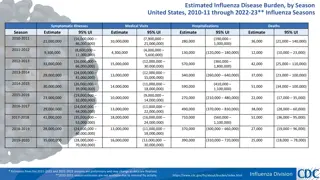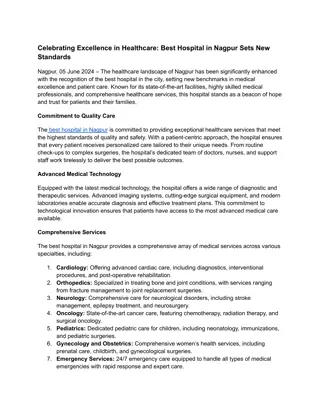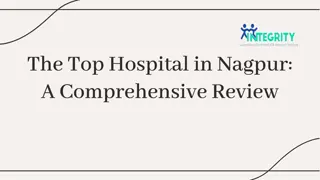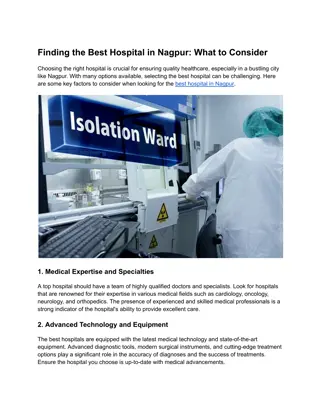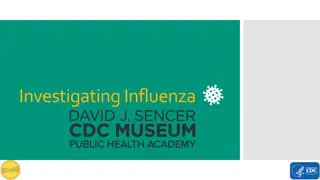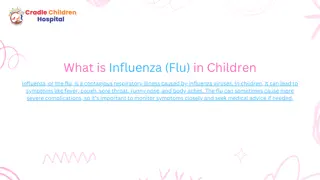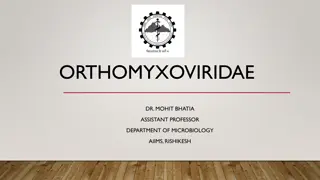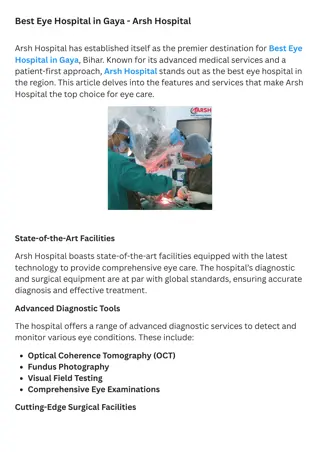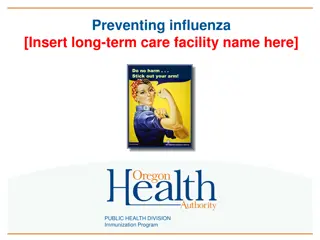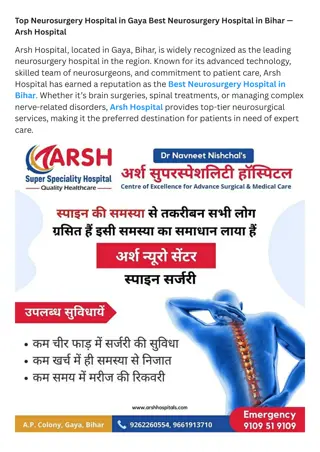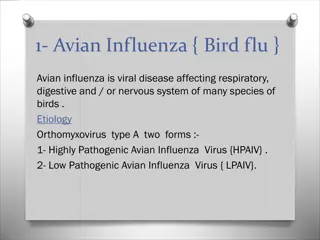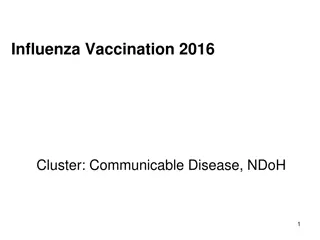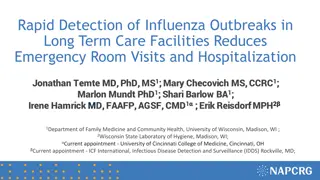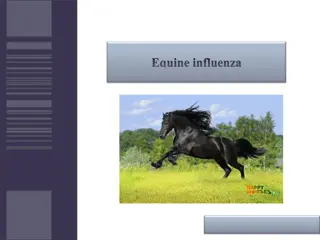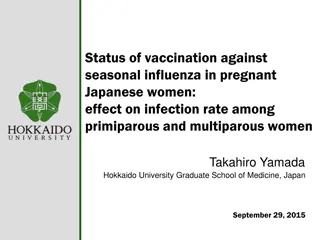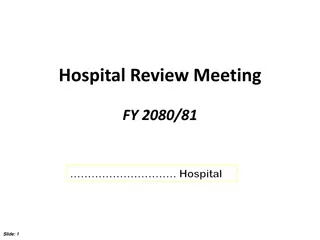Preventing Influenza at [Name of Critical Access Hospital]
Influenza, commonly known as the flu, is a contagious respiratory illness that affects millions annually, leading to hospitalizations and even deaths, particularly among older individuals. The 2016-2017 flu season alone saw staggering numbers of influenza cases and associated medical visits. Protecting against the flu is vital, with flu shots recommended for various groups including patients, staff, pregnant women, and household contacts. Recognizing symptoms such as body aches, chills, fever, and sore throat can aid in early detection and prevention.
Download Presentation

Please find below an Image/Link to download the presentation.
The content on the website is provided AS IS for your information and personal use only. It may not be sold, licensed, or shared on other websites without obtaining consent from the author.If you encounter any issues during the download, it is possible that the publisher has removed the file from their server.
You are allowed to download the files provided on this website for personal or commercial use, subject to the condition that they are used lawfully. All files are the property of their respective owners.
The content on the website is provided AS IS for your information and personal use only. It may not be sold, licensed, or shared on other websites without obtaining consent from the author.
E N D
Presentation Transcript
Preventing Influenza At [Name of Critical Access Hospital] Stick out your arm! Do no harm . . . Mo. Day, Year
The Pathogen Influenza, often called the flu Influenza, often called the flu Contagious respiratory illness Contagious respiratory illness Symptoms vary Symptoms vary Silent Carriers Silent Carriers
How Bad Is It? Thousands of flu deaths annually Thousands of flu deaths annually 200,000 people are hospitalized annually 200,000 people are hospitalized annually 90% of the deaths are people 65 and 90% of the deaths are people 65 and older older www.cdc.gov, 2015
Have you heard? 2016-2017 Flu Season: 30,900,000 influenza illness 14,500,000 flu-associated medical visits 600,000 flu-associated hospitalizations 65 years and older? 4.6 million illnesses 2.6 million medical visits 423,000 hospitalizations http://www.cdc.gov/flu/about/disease/2016-17.htm 4
How Can We Protect Those We Care For? You are one of the most important You are one of the most important defenses against the flu entering defenses against the flu entering [Name of Critical Access Hospital] [Name of Critical Access Hospital]
How Can We Stop Flu? Who should get the shot Who should get the shot All in All in- -patients and out patients and out- -patients without contraindications contraindications patients without All All staff; paid and volunteers staff; paid and volunteers Family and visitors of clients Family and visitors of clients Pregnant women Pregnant women and people with chronic health and people with chronic health conditions conditions Household contacts & caregivers of Household contacts & caregivers of children < 6 months children < 6 months All people from 6 months of age and older All people from 6 months of age and older without contraindications without contraindications
Sign & Symptoms of Flu Body Body aches aches Chills Chills Dry cough Dry cough Fever Fever Headache Headache Sore throat Sore throat Stuffy nose Stuffy nose
Flu Prevention Get vaccinated! Your best protection! Practice good hygiene Wash hands often Cover your mouth/nose when you cough/sneeze Put used tissues in waste basket Clean your hands after you cough/sneeze Avoid touching your face, eyes, nose or mouth If you are diagnosed with the flu Stay home Avoid close contact with others, or wear a mask Get rest and drink plenty of fluids
Misconceptions Reasons why many do not get immunized Reasons why many do not get immunized I don t think flu shots work I don t think flu shots work I ve never gotten the flu, so I don t need the I ve never gotten the flu, so I don t need the vaccine vaccine Getting the shot will cause the flu Getting the shot will cause the flu I got the shot last year I got the shot last year I hate needles I hate needles
Did you know? A study published in the journal of the American Medical Association finds that getting the influenza vaccine lowers a person s odds of a having heart attack, stroke, heart failure, or other major cardiac event including death by about a third over the following year. can help protect against premature labor and delivery http://www.health.harvard.edu/blog/flu-shot-linked-to-lower-heart-attack-stroke-risk-201310236795 http://www.mayoclinic.org/diseases-conditions/heart-disease/in-depth/flu-shots/art-20044238 http://www.cdc.gov/flu/pdf/partners/flu-pregnancy-infographic.pdf 10
What I can do to prevent the flu? Do no harm Do no harm Stick out your arm! Stick out your arm! This project is supported by the Health Resources and Services Administration (HRSA) of the U.S. Department of Health and Human Services (HHS) under grant number and title H54RH00049, Rural Hospital Flexibility Program for grant amount $5,000. This information or content and conclusions are those of the author and should not be construed as the official position or policy of, nor should any endorsements be inferred by HRSA, HHS or the U.S. Government.
Have you heard? [Name of Critical Access Hospital] [Name of Critical Access Hospital] will be offering the flu shot will be offering the flu shot [today or mm/dd/yyyy] and also [today or mm/dd/yyyy] and also during work shifts during work shifts
![Preventing Influenza at [Name of Critical Access Hospital]](https://cdn1.slideorbit.com/233818/preventing-influenza-at-name-of-critical-access-n.jpg)


